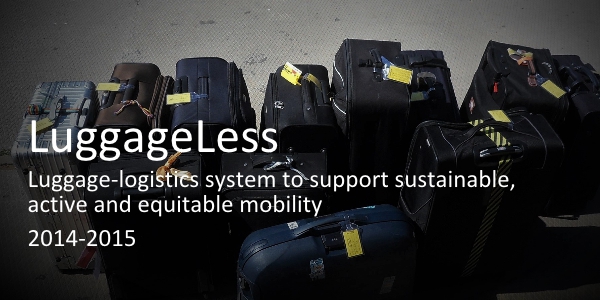LuggageLess

Luggage is one of the main reasons why people use their own autos for travel and everyday mobility. To promote active and sustainable forms of mobility, it is essential to develop innovative luggage-logistics systems that decouple luggage transport from passenger transport.
Client: bmvit, mobility of the future, 2nd call for tenders
Duration: March 2014 to February 2015 (12 months)
Project partners: Vienna University of Technology, Railway Research Department; St.Pölten University of Applied Sciences; Upper Austria University of Applied Sciences; Post AG; ÖBB Holding
LOI partners: SBB – Schweizerische Bundesbahnen; DB-AG – Deutsche Bahn AG; Newrail – Newcastle University, Centre for Railway Research; DLR – Deutsches Zentrum für Luft- und Raumfahrt; CAT – City Airport Train; Westbahn Management GesmbH; WLB – Wiener Lokalbahnen; Verband der Bahnindustrie; Salzburg Airport; Oberösterreich Tourismus; ÖAR – umbrella organisation of Austrian associations for the disabled
Project description: Luggage has the greatest value in terms of transport elasticity, which is why taking and transporting luggage, both when travelling and as part of everyday mobility, means that the majority of people choose their own auto. Conversely, taking luggage with you when using sustainable forms of mobility causes great difficulties and reduces the attractiveness of these systems. Especially for the large group of people with limited mobility, it is difficult or even impossible to carry luggage, which is why travel or everyday journeys are often not even started and immobility increases. If the goal is to expedite and promote active and sustainable forms of mobility for all population groups, it is unavoidable to develop a luggage-logistics system that covers all areas and meets all customer requirements. Only when the boot of your own auto has been fully replaced, will these forms of mobility be selected to the desired extent.
Since an intermodal luggage-logistics system that ideally functions parallel with and simultaneously to passenger transport is extremely complex, the LuggageLess exploratory project was the first step in all further developments. In order to minimize the development risks for future projects, all requirements were clearly defined in advance and various concepts were evaluated in terms of acceptance, cost-effectiveness and feasibility, and all challenges were presented in the best possible way. To this end, extensive surveys of potential customers (on trains, at airports, in shopping streets, shops and online) as well as expert interviews and workshops were conducted.
The aim of the project was to comprehensively understand and present the customer needs and the technical and logistical challenges in order to develop a clear catalogue of requirements for future research and development projects in luggage logistics.
Contact: DI Dr. Bernhard Rüger
